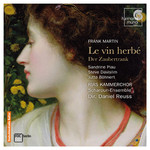
Le Vin herbe (based on three chapters of the novel 'Tristan et Iseut' by Joseph Bedier)
 $58.00
Out of Stock
$58.00
Out of Stock6+ weeks add to cart
FRANK MARTIN
Le Vin herbe (based on three chapters of the novel 'Tristan et Iseut' by Joseph Bedier)
Sandrine Piau (sop) Steve Davislim (ten) Jutta Bohnert (sop) / RIAS Kammerchor / Scharoun Ensemble / Daniel Reuss
[ Harmonia Mundi / 2 CD ]
Release Date: Tuesday 1 May 2007
This item is currently out of stock. It may take 6 or more weeks to obtain from when you place your order as this is a specialist product.
"Often cited by those in the know as one of music's best-kept secrets, this is Tristan and Isolde as told by Frank Martin. As with the Wagner setting there are expressionist touches but also great directness of emotion. The score is full of understated beauty, here given a knowing, involved and humane reading." EDITOR'S CHOICE GRAMOPHONE JULY 2007
RECORDING OF THE MONTH GRAMOPHONE JULY 2007
"Often cited by those in the know as one of music's best-kept secrets (presumably no longer if this recording has the success it deserves), this is Tristan and Isolde as told by Frank Martin. As with the Wagner setting there are expressionist touches but also great directness of emotion. The score is full of understated beauty, here given a knowing, involved and humane reading."
(Gramophone)
"Frank Martin is the pre-eminent Swiss composer of modern times, yet his music has never enjoyed wide acceptance. But his civilized music has real depth and eloquence, and nowhere is this better shown than in his oratorio Le vin herbe. There is, here, a fascinating stylistic mix - from atonality to a very Ravelian tonality - and the re-telling of the Tristan and Isolde tale is achieved in memorable fashion."
(Dominion Post recording of the Year 2007)
Directly based on Joseph Bédier's modern French adaptation of the legend of Tristan and Iseult, Le Vin herbé enabled Frank Martin, in the years immediately after World War II, to achieve the international reputation that his excessive discretion had denied him until then. The Swiss composer, a subtle intermediary between French and German cultures, strove to differentiate himself from Wagner at a time when the latter's music was being hijacked by the Nazis; but what is most remarkable in this ever-surprising score is its extraordinary freshness of invention, free of all dogmatic systems, yet not totally renouncing serialism, for example.



